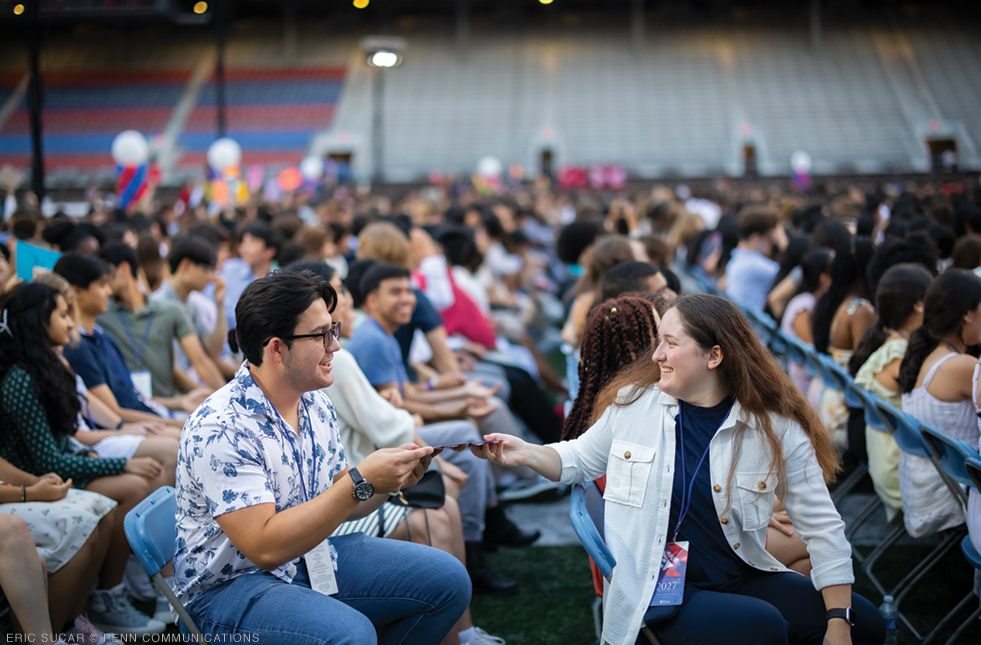
In a new setting at Franklin Field, President Magill urged the Class of 2027 to take the “wide view” at Penn.
This year’s Convocation had a few firsts: for the Class of 2027 beginning their time at Penn, for John L. Jackson Jr. welcoming students to the University for the first time as provost, and for everyone else in attendance at Franklin Field, which was a new setting for the ceremony.
After last year’s Convocation on College Green was disrupted by protesters representing the Save the UC Townhomes coalition [“Gazetteer,” Nov|Dec 2022], and because of ongoing construction on College Hall blocking a significant portion of College Green and Locust Walk, Convocation was moved to Franklin Field—with significant security measures.
As freshly printed PennCards were scanned (some students had forgotten their cards, causing a significant holdup entering the field) first-year and transfer students entered the stadium. Guests and observers were limited, and only people with PennCards were permitted to attend the ceremony.
The Class of 2027—made up of 2,416 people from 96 countries—was welcomed by Vice Provost and Dean of Admissions Whitney Soule, who shared a message about gratitude.
In
their Penn applications, nearly 60,000
applicants were prompted to write thank you notes to someone, the first time the admissions team has made such a
request. With consultations from Penn professors Angela Duckworth G’03 G’06,
Adam Grant, and Martin Seligman Gr’67, the prompt was designed to see how
students could “accept positive influence from others, the kind that elicits
reflection and inspiration,”
according to Soule.
“Accepting influence is essential to relationships, to building community, and of course to learning,” said Soule, who urged students to continue this exercise of gratitude throughout their time at Penn. “Please notice the positive influence of others. Acknowledge it. Maybe write it as a note. Pass it on.”
Penn President Liz Magill then took the podium to welcome the incoming students and share the meaning of Convocation, from the Latin “convocare, a word which, if I remember my Latin correctly, translates roughly to ‘a lot of speeches and then there’s dessert,’” she joked, referring to the annual dessert reception following the ceremony.
“It also means ‘a call together,’” continued Magill, who asked the attendees to complete an activity. Students in the front row were each given a different colored card and were instructed to turn to the person behind them, say hi, and then pass the card—on and on, until the card reached the back row.
At first, the students seemed to treat it like a relay race, moving fast. When the people in the back rows received the cards, there were small outbreaks of cheers and applause. But soon, they would learn that finishing first wasn’t the intention. Following the exercise, Magill asked for a show of hands of those who remembered the color of the card that they passed; nearly everyone raised their hands. Then, she posed a second question: “Do you remember the colors of the cards on either side of you as they were being passed back?” Very few hands were raised as mumbles spread across the crowd.
“I’m willing to bet that that’s a little harder to answer that second question. That’s because we’re hardwired to focus on what’s right in front of us,” said Magill, a tendency she attributes to “the zoom lens,” a kind of hyper focus (on, say, a specific goal or obstacle) to which Penn’s highly accomplished incoming students have likely been attuned.
“The opposite of a zoom lens is called a fish-eye lens. That’s the wide view. It sees the periphery, it engages panoramically,” she explained. “I encourage you to spend at least part of your time at Penn with a fish-eye lens.”
Magill didn’t try to claim that the zoom lens was unimportant but that, when you rely on it exclusively, you could miss brilliant things going on around you. “You have to go about Penn every day with a broad and inquisitive view along with that laser focus you brought with you,” she said.
She explained it’s that kind of wide view that has allowed some of Penn’s most renowned faculty members to make discoveries, including Nader Engheta, the H. Nedwill Ramsey Professor in Electrical and Systems Engineering, who earlier this year won the Benjamin Franklin Medal for his work on light-wave technology.
Engheta originally researched radio waves, until a colleague invited him to study green sunfish and the “physiological adaptations in its eyes that give it an advantage underwater,” Magill said. “Their collaboration eventually led to a new field of study, new camera technology, and new paths to other foundational discoveries … all because he approached his work at Penn with a fish-eye lens. Quite literally in this case.”
“Penn people excel at zooming out and exploring across fields,” Magill continued. “They’re expert innovators at the boundary points between. And you all are no exception.”
Jackson, who began as provost on June 1 after serving as dean of the Annenberg School for Communication [“Gazetteer,” May|Jun 2023], also welcomed the incoming students, remarking that, like them, he was in the middle of a new beginning. Explaining that he couldn’t paint a picture of what their time at Penn would look like, he said “it kind of looks new, and exciting, and even, if I’m honest, a little bit daunting.”
Jackson drew from his knowledge as an anthropologist in sharing wisdom with the new students. He explained that humans differ from animals in four main ways: stones (material artifacts), tones (communication through writing and speech), bones (our physical traits), and thrones (our cultures and beliefs). But these things that unite humans are often the things that also cause division. “I’m sure you’ve already noticed this is a community filled with differences,” Jackson said. “At Penn, you will become not simply well educated but well rounded, exposed to new ideas and different people, prepared and excited to lead in a multicultural, multi-everything world defined by a plethora of differences.”
He encouraged students to learn from the differences of their peers—and embrace them. “Class of 2027, if I can leave you with one clear message this evening, it’s this: Dare to be different.”
—Meg Gladieux C’23 GEd’24




